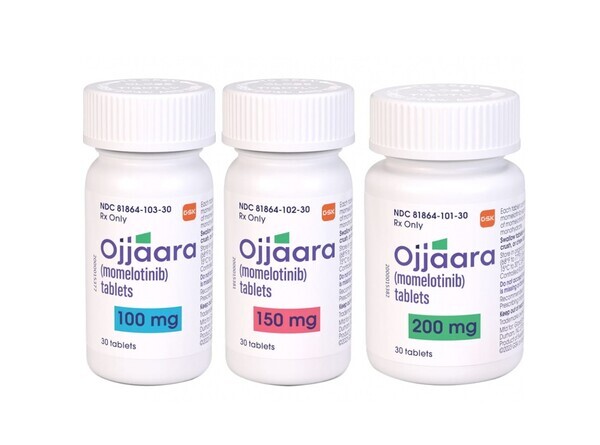GlaxoSmithKline Korea (GSK Korea) has officially launched Ojjaara (ingredient: momelotinib dihydrochloride hydrate), its new treatment for myelofibrosis.

GSK Korea launches Ojjaara, a new JAK inhibitor for myelofibrosis, offering a unique triple-inhibition mechanism to address anemia while managing systemic symptoms and splenomegaly.
The company expects that Ojjaara will address the significant unmet medical need for anemia management while also improving systemic symptoms and splenomegaly, key therapeutic targets in myelofibrosis treatment.
Myelofibrosis is a rare and life-threatening hematologic malignancy characterized by bone marrow fibrosis, leading to a progressive decline in normal blood cell production.
It affects approximately four to six individuals per 100,000 people annually worldwide, with 2,292 known patients in Korea as of 2023. The disease manifests in symptoms such as splenomegaly, anemia, chronic fatigue, night sweats, and bone pain, significantly impairing patients’ quality of life.
Before the launch of Ojjaara, anemia was a significant unmet need in the treatment landscape for myelofibrosis. Severe anemia increases dependence on blood transfusions and can be life-threatening. Studies indicate that severe anemia raises the mortality risk for myelofibrosis patients by 3.4 times. Given that 87 percent of patients with primary myelofibrosis are anemic at the time of diagnosis, effective anemia management has been a critical challenge.
Ojjaara was approved by the Ministry of Food and Drug Safety (MFDS) in September last year as a treatment for adult patients with intermediate- or high-risk myelofibrosis, including primary myelofibrosis, post-polycythemia vera myelofibrosis, and post-essential thrombocythemia myelofibrosis.
The drug distinguishes itself with a unique triple-inhibition mechanism, targeting JAK1, JAK2, and ACVR1 (activin A receptor type 1). While JAK1 and JAK2 inhibition help reduce systemic symptoms and spleen enlargement, ACVR1 inhibition lowers hepcidin expression, thereby alleviating anemia.
Clinical trials, including the SIMPLIFY-1 and MOMENTUM phase 3 studies, confirmed Ojjaara’s efficacy in treating myelofibrosis patients with anemia, demonstrating significant reductions in spleen volume and transfusion dependency.
The SIMPLIFY-1 trial, a randomized, double-blind, multicenter phase 3 study comparing Ojjaara with ruxolitinib as a first-line treatment for myelofibrosis, found that Ojjaara was non-inferior to ruxolitinib in reducing spleen volume by 35 percent or more at 24 weeks.
However, it did not meet non-inferiority criteria for total symptom score improvement. Notably, the proportion of transfusion-independent patients was significantly higher in the Ojjaara group (66.5 percent) compared to the ruxolitinib group (49.3 percent).
Ojjaara was designated an orphan drug under MFDS guidelines, as Korea's myelofibrosis patient population remains below 20,000, and the drug has demonstrated significant efficacy and safety compared to existing treatment options.
“Existing JAK inhibitors have demonstrated efficacy in reducing splenomegaly and systemic symptoms but often exacerbate anemia, increasing transfusion dependence. A new treatment option addressing this unmet need was necessary,” Professor Ahn Seo-yeon of the Department of Hematology & Oncology at Chonnam National University Hwasun Hospital said. “Ojjaara is the only JAK inhibitor approved in Korea that improves anemia while also managing systemic symptoms and splenomegaly, regardless of prior JAK inhibitor use.”
Given its significant clinical value in anemia management, the company anticipates that its launch will greatly enhance treatment outcomes and quality of life for myelofibrosis patients, Ahn added.